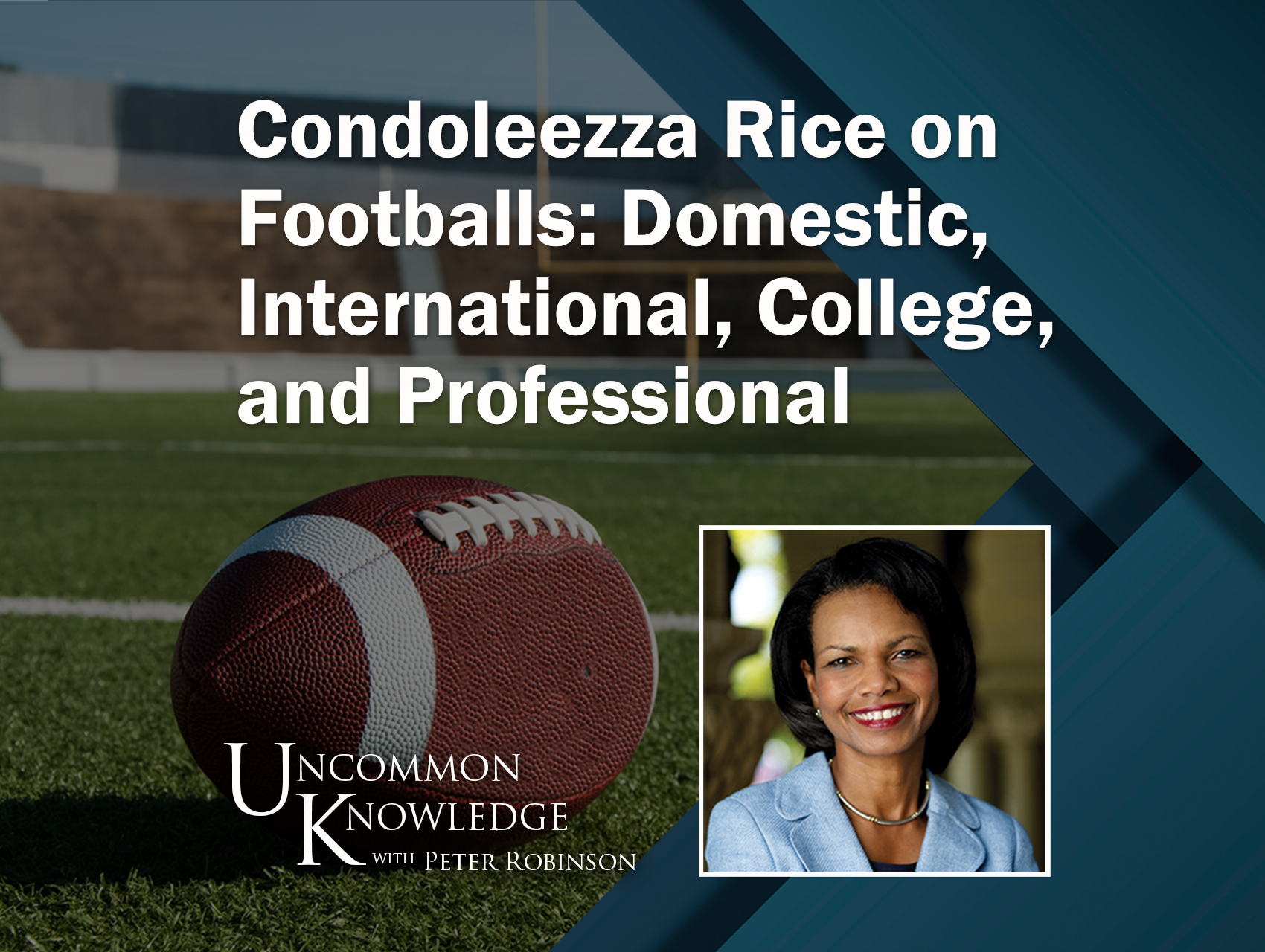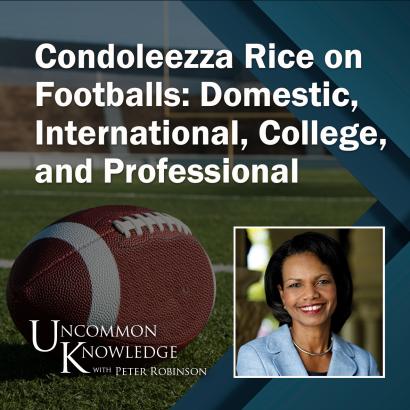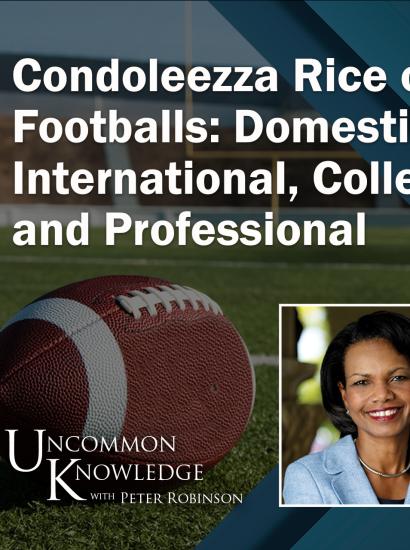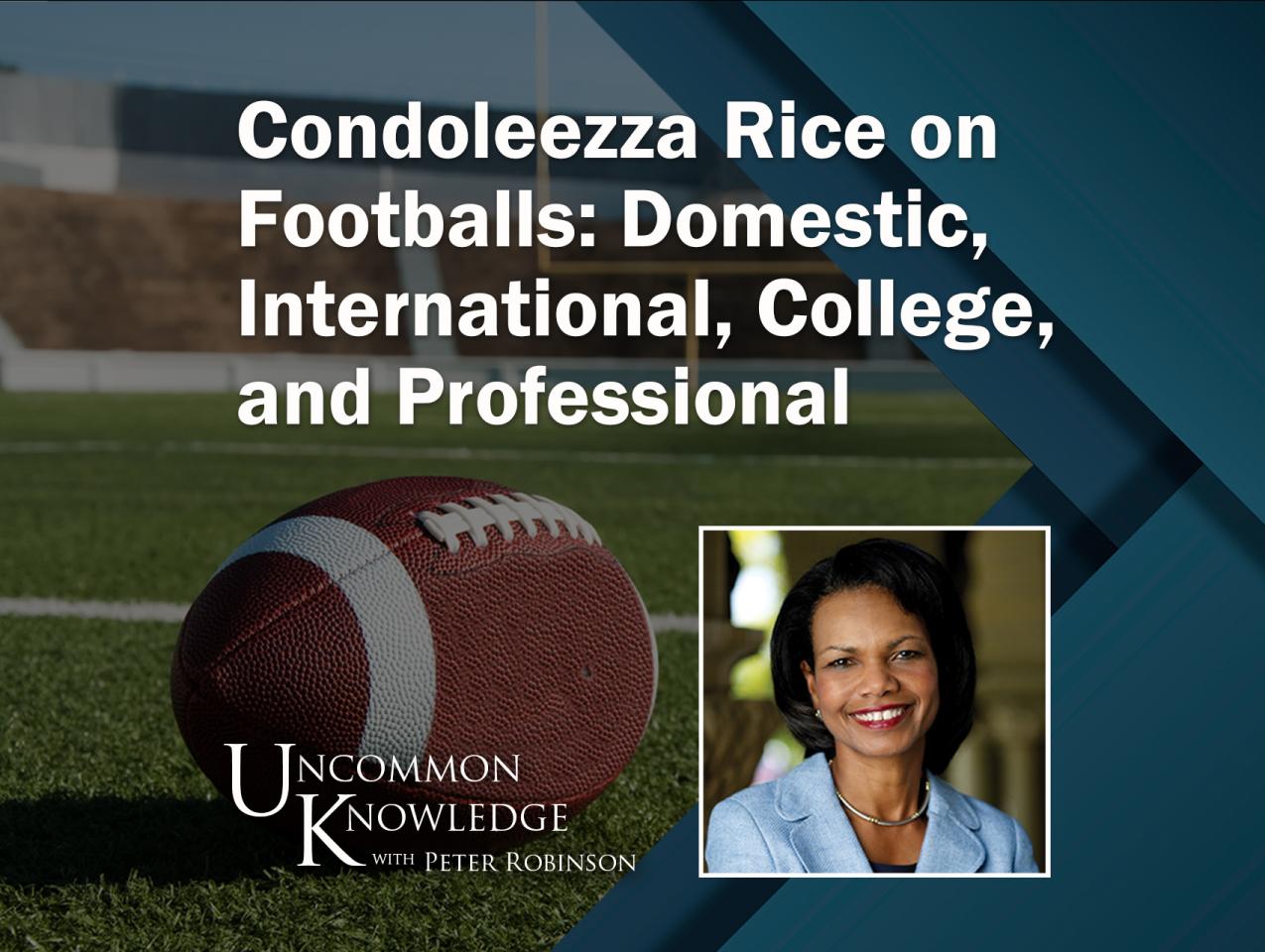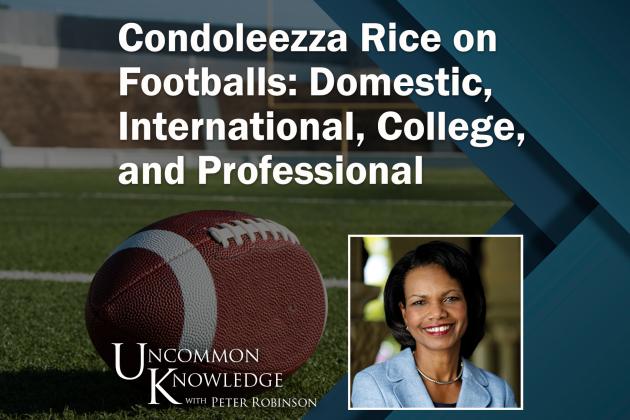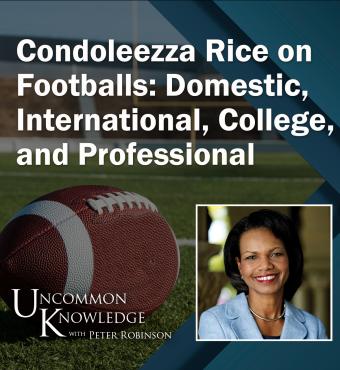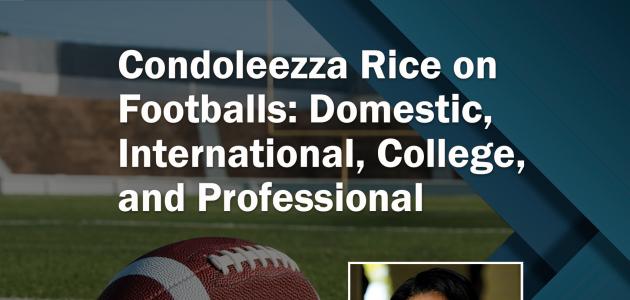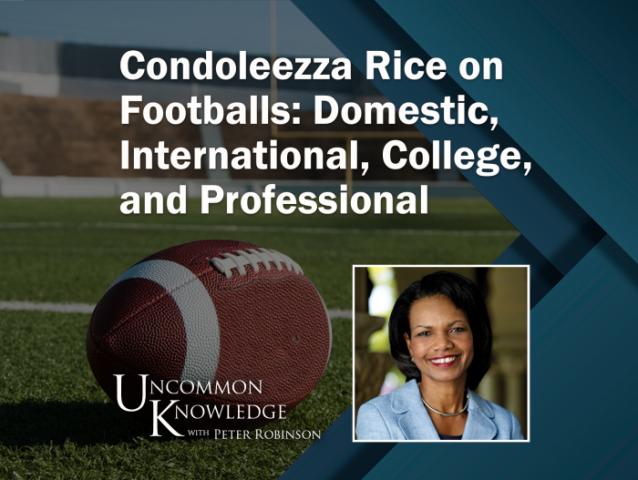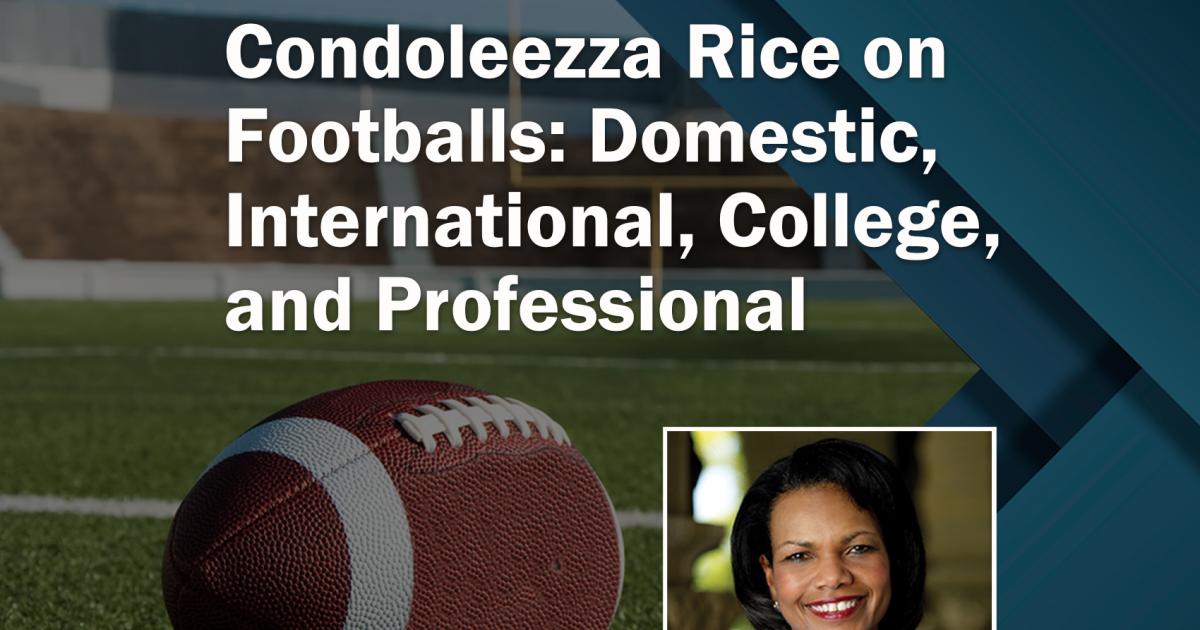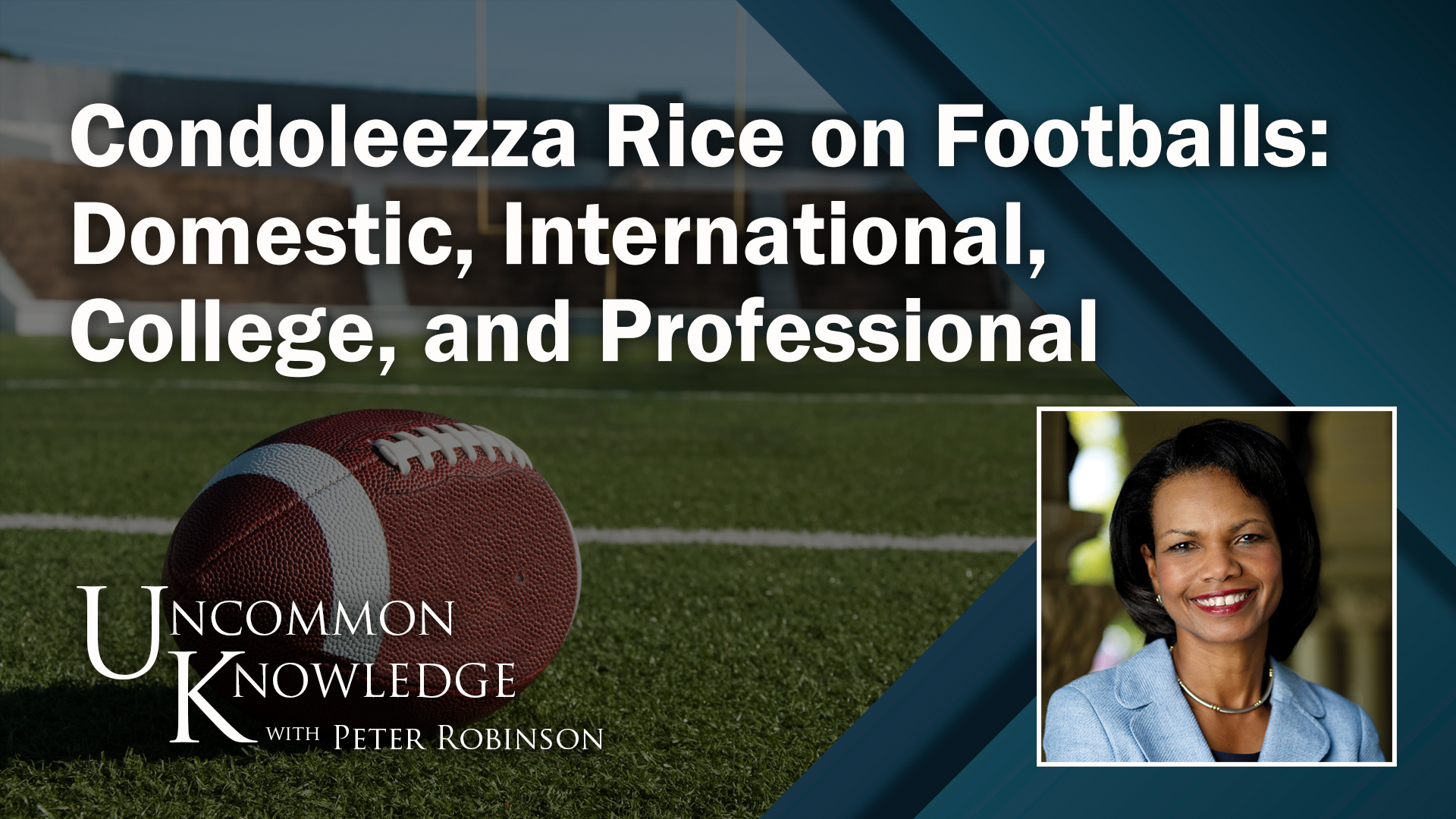Current Hoover Institution director and former secretary of state and national security advisor to President George W. Bush, Condoleezza Rice is the only person in the world who can speak knowledgeably about the Russian invasion of Ukraine, the threat from China . . . and the Denver Broncos and why college sports must be saved from itself. And that’s exactly what she does in this must-hear conversation.
To view the full transcript of this episode, read below:
Peter Robinson: Think about it. How many people can speak knowledgeably, masterfully about the Russian invasion of Ukraine, the threat from China and the Denver Broncos, Condoleezza Rice on Uncommon Knowledge now. Welcome to Uncommon Knowledge, I'm Peter Robinson. The daughter of a Presbyterian minister and a school teacher, Condoleezza Rice grew up in Birmingham, Alabama. She received her undergraduate degree from the University of Denver, a master's degree from Notre Dame, and a doctorate, once again, from the University of Denver. Dr. Rice has served in many positions, including Provost of Stanford University, US Secretary of State, and now director of the Hoover Institution, the think tank here at Stanford. Condi, welcome.
Condoleezza Rice: It's a pleasure to be with you, Peter.
Peter Robinson: We'll come back to football.
Condoleezza Rice: Please do.
Peter Robinson: By the way, I don't know if you noticed there's a certain chill in the air this morning here in Northern California, and it's football weather.
Condoleezza Rice: It's football weather.
Peter Robinson: It's football weather.
Condoleezza Rice: It's football weather.
Peter Robinson: Yes.
Condoleezza Rice: It is indeed.
Peter Robinson: So, however, one question, I have to start with this. You joined the new ownership group of the Denver Broncos, the deals gone through.
Condoleezza Rice: Yes.
Peter Robinson: You are an owner of the Denver Broncos. So, what about it? The record last year was seven and 10. What's your prediction for this year?
Condoleezza Rice: I never predict these things. All that I can say is we've got a great quarterback in Russell Wilson. We've got a new team. This is a new coach and new team, and so let's check it out after about halfway through the season, people get all kind of, oh my goodness, what's going wrong? It's a long season. But I think we're going to be really just fine and be very good. And bring back those traditions of a Denver Broncos team that I remember as a kid growing up in Denver when there was something called the Orange Crush. One of the great defenses of all time that went on to take the Broncos to the Super Bowl for the first time. So, check back with me.
Peter Robinson: This is interesting because you were transferring to football, your skills as a professional diplomat. All right. I want to come to the large issues of the day in just a moment, but I realize that the last time we sat down for an interview was your first day as director of the Hoover Institution.
Condoleezza Rice: Oh my gosh, that long? Yeah.
Peter Robinson: And when I asked you what everybody was wondering, which was why would she take that job? This is what you replied. I'm quoting you, Condi. "We have challenges piling up to the governance of free peoples, and that suggests to me we need really good answers. I thought there's no better place to search for those answers than the Hoover Institution, a place with a very solid foundation in the importance of freedom." Two years and a couple of months later. How's it going?
Condoleezza Rice: It's going great. What I've been really, really encouraged by, and Peter, and you know this place, we have wonderful senior fellows who are at the forefront of their areas in economics and education, in technology, in governance. And what really has been terrific is to see the collaborative spirit of these senior fellows. People often think academics are people who go into a room and they study on their own. But if you're going to have anything to say about the big problems of our time, they're too big for any one person, for any one discipline. And so what we really have here at Hoover is an interdisciplinary multi fellow approach to these big issues. What to do about the rise of China, or as we call it, Chinese sharp power. Great, great phrase, I think. How to think about a better K12 future for our children, including so that parents have choices no matter their station in life as to where their kids will go to school.
We sit in the Silicon Valley, and so technology, which is shaping our world dramatically every day, new technologies. How do we think about the institutions? How do we think about the role of state and local governance? We are a federal system. And here at Hoover, we talk about what President Hoover said, limited government. But it also meant getting government at the right level. So, not everything should happen in Washington, DC. And so we are working very hard on those areas. And something that I'm very excited about now, our new center for the Revitalization of American institutions. We were bequeathed by the founders. Extraordinary institutions. A constitution that for more than 230 years now, has been a vehicle through which Americans have been able to exercise their desires, to deal with their fears, to exercise their rights. Madison and those who created the Constitution knew that you needed institutions through which to channel people's passions as they would've said.
And yet we know that those institutions are under attack these days. Those who say, well, they're not worthy because they were the institutions that supported and sustained slavery. Well, they're also the institutions that freed slaves. And when I was a little girl in Birmingham, Alabama eventually got to the descendants of slaves, full rights in America. Those who say, well, they're elitist, those institutions. But Americans understand that that constitution's almost their personal protector. And it really doesn't matter what station in life you came from, that constitution is there for you. So, somehow we have to rekindle Americans' belief in their institutions, their confidence in their institutions, in their elections, in their judiciary. And so we are very excited that one of our new fellows, one that we have recruited from Princeton University, one of America's great political scientists, Brandice Canes-Wrone is the new director for that center. And we're gathering people together to look at this extraordinary set of institutions that we were given and how can we make them better in the modern era.
Peter Robinson: Could I just on that one for a moment, because what you're saying is very striking. We hear as you of course noted over and over again these days attacks on the founding, in particular on the founding. I'm thinking of the 1619 project, and there is a point to be made. Slavery had existed on this continent for more than a century before the founding, and some large proportion of the founders were slave owners. So, we have the notion A, that this means the entire enterprise was misbegotten. Fruit of the poison tree would be the legal term. Was misbegotten from the very beginning. And then there is another way to look at it, which goes far back in American history. And that would be Frederick Douglass.
Condoleezza Rice: Yes.
Peter Robinson: Who said in particular the three fifths rule in the Constitution, that that slaves would be counted as three fifths of a person and that slavery was permitted, although the constitution named a date by which the importation, the slave trade could be ended. And they ended it on January 1st of that. All right. But Frederick Douglass referred to these measures as scaffolding to permit the construction of the edifice to be removed as soon as it was no longer needed. So, he distinguished from the get go between temporary accommodations and the underlying structure. And you're with Frederick Douglass.
Condoleezza Rice: I'm with Frederick Douglass. I believe that America has what I've called, not the fruits of the poison tree, but a birth defect. We were born with a birth defect. Do I wish that the founders had all been John Adams, who not just refused to hold slaves but actually defended slaves in the Amistad incident? Yes. Do I think that Thomas Jefferson might have been accused of, let's say, talking on both sides of the issue to talk about these great principles of all men being created equal and yet holding slaves? Of course. But human beings are imperfect. And somehow today we want to go back and insist on perfection for people who lived hundreds of years ago in a different climate and a different set of morals. And I sure hope that there's nobody out there judging us a hundred years from now in terms of our morals, because human beings are imperfect that I'm very religious.
And my grandmother had a wonderful phrase. She say, "The only human being who was perfect was Jesus Christ. And that's because he was God." And I think we have to understand people in their context, the founders in their context. But to celebrate what they gave to us. This constitution that is so remarkable that it has slowly but surely made America a more inclusive place. It's slowly but surely meant that we the people, which was not what was meant about me. Now I'm included in we the people, and we continue to make progress.
Now, it doesn't mean that we can just rest on our laurels about it, right? Because I do think Franklin was right. It's a republic if you can keep it. And our great patron, George Schultz, as you remember, used to wear that tie that said, democracy is not a spectator sport. So, can't all just sit around and say the glorious institutions, we have to work at it. We have to work at it every day. And that requires a renewal of commitment, not just to our rights, which we're very good at asserting, but also to our responsibilities.
Peter Robinson: So, your fundamental position is with regard to the constitution and the founding and the fundamental institutions of the country, renewal, reform where necessary, not overthrow.
Condoleezza Rice: Absolutely. Absolutely. And when I would go abroad as secretary and people would say, but how can you talk about democracy in X, Y country when your country was founded with slaveholders? And I would say, yes, but it's that same constitution that I took an oath of office to as a descendant of, by the way, both slaves and slave owners. And it's that constitution that was progressive enough that today I stand before you as the Secretary of State of the United States of America. And people didn't say much after that.
Peter Robinson: Unanswerable. All right. So, I can only do this if we set up some lights and cameras, but I've done it. I have you to myself.
Condoleezza Rice: You do.
Peter Robinson: So, I'm going to ask you to give me a seminar in the way to think if you have policies prescriptions, if you know what we ought to do, say so. But what I'm interested in is the way you think, the way a professional thinks about the big issues, the foreign policy issues of the day. And then of course, we'll save this little lovely piece of cake right here, which is football. We'll get to that.
Condoleezza Rice: Yes. Yes.
Peter Robinson: Walter Russell Mead, Russia and Ukraine. Walter Russell Mead in the Wall Street Journal, just yesterday, as we tape this show, "Vladimir Putin has responded to the weakening of his military position by annexing four contested regions inside Ukraine, declaring that the conflict in Ukraine is a war for the survival of Russia and raising the spectrum of a nuclear strike." These are words that appeared at the Wall Street Journal yesterday. Mead continues, "This represents the most dangerous international confrontation since the 1962 Cuban Missile Crisis." The most serious confrontation in the last six decades.
Condoleezza Rice: Oh, I don't doubt that it's an extremely serious confrontation. I don't like to try to rank confrontations because they're always different and the circumstances are different. The Russians were not a major nuclear power at the time of the Cuban Missile Crisis. One reason that Khrushchev put those missiles in Cuba was he couldn't reach the United States from the territory of the Soviet Union. So, it was a different time. But yes, it's dangerous. But there are three things I'd like people to understand about this conflict. The first is Vladimir Putin is not trying to reconstruct the Soviet Union. He's trying to reconstruct the Russian empire. He is a Russian nationalist for whom an independent Ukraine is an anathema. And he believes in the concept of the Kievan Rus’. They're all one people. Well, the Ukrainians have a different view, and that's the second point. The Ukrainians actually are a nation.
They speak a language that is distinct from Russian. I have pretty good Russian. Ukrainian, I'll make mistakes if I try to understand it. And they believe that they are a distinct people. Now, it is true that they've only been independent a few decades in their history here and there. They've been part of somebody else's empire. But what's remarkable is that this Ukrainian nation has remained intact. And that's one of the things that Vladimir Putin didn't understand. And so he thought they would be welcomed by the Ukrainians, but actually they're fighting for their nation, and they are becoming forged as a nation even more every day. So, that's the second thing to recognize. Now, if you think and you take those together, you will understand why Putin now really has a problem. Because he essentially went to the Russian people and said, I'm doing this special military operation to put us back together with our brothers in Ukraine. And oh, it won't really affect your lives because they're going to rise up and support us, and this will all be over.
And by the way, I think he told Xi Jinping the same thing. This'll be over in a few days. The Russian military went into that conflict with five days of provision and their dress uniforms for the parade. That just shows how off he was in his thinking. Oh, now all of a sudden this Ukrainian nation is not just fighting back. They're pushing the Russians out of the territories that they've occupied. So, now he's got a problem. And number one, he needs more people. So, he has to do what he avoided until this moment, mobilize young Russian men to go to the front. And they're fleeing in numbers. As someone told me that one of the most heavily accessed articles on the internet in Russia's, "How do I break my own arm?" Because people don't want to go. So, suddenly Russians are in the fight and they don't like it. Secondly, Putin is sitting there-
Peter Robinson: Whom you knew?
Condoleezza Rice: Whom I knew. And I knew he was a Russian nationalist. It didn't really fully sink in until I really began to think about why he does this. Now so, he's had to mobilize the Russian people, that's bad. Another point to make is that he had to do something dramatic, because we tend to think of autocrats or dictators as not having a politics to which they have to respond.
Peter Robinson: They don't have to answer to anyone.
Condoleezza Rice: They don't have answer anyone. He has to answer to these Russian nationalists, his right wing, if you will, that he actually mobilized in support of the war. So, what he did was to cut off the liberals who might have been against the war. He had jailed Navalny. He shut down their websites. He made protesting the war a crime. But he actually embedded these Russian nationalist journalists in the military. They were supposed to talk about the glory of the war. Now they're talking about the failures of the war. And so he has to respond. So, the mobilization and the annexation are the response. Final point, nuclear weapons. Yes, I would've told you, Peter, three months ago, oh, chances are zero. It's not zero. Maybe it's 10%, because I don't think he wants to cross that line. Russia would then be a permanent pariah. He himself would be a permanent pariah if he isn't already. But it's not zero. And that makes me uncomfortable. I do hope somebody's telling him, by the way, that prevailing winds go east. And so he would be polluting his own country.
Peter Robinson: One more question, and again, this may sound as though I'm being a devil's advocate a little bit. But the question is how correctly to think about the problem? And the question is very simple. What have they got to do with us, Ukraine? So, the Russians invade on February 24th. We've sent vast amounts of weapon material.
Condoleezza Rice: Yes, yes.
Peter Robinson: We have, as I understand it, hundreds of members of our special forces in place on the ground in Ukraine, engaging in training. They're not involved in combat, but there are a lot of Americans there.
Condoleezza Rice: And we've been training them since 2014, which is, by the way, why they're good.
Peter Robinson: Why they're good. All right. And we're sharing detailed intelligence with Ukraine. We even know that the Russians had their dress uniforms in their backpacks when they invaded. And we've provided, I've put this number together the day before yesterday, in the last 18 months, our A to Ukraine, 17 billion. I think just yesterday, President Biden committed to some other untold.
Condoleezza Rice: 600 plus.
Peter Robinson: All right.
Condoleezza Rice: Yes.
Peter Robinson: And the question is why? Ukraine was part of the Soviet Union for seven decades. Our economy grew, we remained at peace. It's demonstrable that we can get along without them. And now of course, I'll just lay out the whole argument here instead of putting it out in bits and pieces. This is taking place in Europe. Germany is a rich country to name only one. For the last, I checked this, as you know, NATO countries commit to spending at least 2% of their GDP on defense.
We spend, I think the latest figures is close to 4%. I think it must have gotten, it touched 4% under during your administration. In the last 30 years, Germany has not once, not once fulfilled its requirement to spend 2% on GDP. So, it would strike me, I mean, the test here is, which is a test that you'll appreciate because you have a very keen sense for practical politics, not just diplomacy up here on the seventh floor, the fancy floor of the State Department. But you go into a diner in Iowa, and you have to explain to the waitress and the farmers why we're going to take their tax dollars. So, what is our interest in Ukraine? You see that the whole ... Why don't the European, maybe it'll take them a while, maybe it'll be sloppy. But for goodness sake, let Poland and Germany, and if Germany and France stood up as quickly and as vigorously as Britain has, they could handle it on their own. Goes the argument.
Condoleezza Rice: Yeah, goes the argument.
Peter Robinson: All right.
Condoleezza Rice: So, I'm going to start with a general point that starts with some dates. 1914, 1941, 2001, problems never stay confined. And you can act now or you can act later. And the idea that we can somehow, behind our great oceans on both sides and our peaceful neighbors to the north and south, just let the world take care of its own problems. It simply never worked out that way. So, you really want to take that risk now. Secondly, we've believed in a rules based order. We've always said that when a people rise up and they want to defend themselves, we should be there to help them. Particularly if they're defending the values that are core to us. And this peaceful country sitting there, that by the way, we recognized, we recognized an independent Ukraine. We were part of the guarantor of their sovereignty and their security when we got them to give up their nuclear weapons at the end of the Soviet Union.
Peter Robinson: They're in the fix, they are now.
Condoleezza Rice: You better believe it.
Peter Robinson: Because we promise-
Condoleezza Rice: We promise that we're going to take care of them.
Peter Robinson: That we'll take care of them.
Condoleezza Rice: And so do we believe in the rules based order? Do we want to live in a world where big countries simply annihilate and then absorb smaller countries? I think we've done that, seen that picture before around 1938, 1939 didn't work out so well. And then the last point that I would make to my fellow Americans is that we as a people represent and are a part of a country that is actually not a territorial or an ethnic or it's not an identity of that kind. It's an idea.
The American ideal is one of universal values. And so we either have to defend them or we don't. To your point about the Europeans, I went all over Brussels and every NATO meeting, just like every former secretary of State going back, every president, please pay your 2%. Please pay your 2%. Now, I have to say, President Trump, for my point of view, wasn't the world's greatest diplomat. But he did go to them and say, and I'll pay your 2%, or I might not defend you. Now, I probably wouldn't have put it that way, but it actually did start to get peoples attention.
Peter Robinson: He did their attention.
Condoleezza Rice: Did start to get people's attention. And not only are they starting to pay up, but what has happened in Europe because of Putin's invasion has changed the context in Europe in a fundamental way.
Peter Robinson: For the better.
Condoleezza Rice: For the better. The Germans now, a friend of mine said Putin has ended German pacifism and Swedish neutrality all in a few months. Can you imagine?
Peter Robinson: And invented real nationalist in the Ukraine.
Condoleezza Rice: And invented real nationalist in the Ukraine. And can you imagine Finland and Sweden as members of NATO now. By the way, strong countries with great capabilities, now this is a stronger, better NATO. Germany, I think will play more of a role. Now they've been slow in getting equipment to Ukraine. Sometimes it's hard to remember with the German bureaucracy, the German defense ministry. For a long time we wanted a German army that would fight. And so the defense-
Peter Robinson: Happy in their equipment.
Condoleezza Rice: Yeah. So, the defense gene in Germany is not that deep. The military gene in Germany is not that deep because it was our intention to subsume it in NATO, to subsume it in the European Union. That it is beginning to reemerge as something that we should celebrate. And I think when you've got people in Ukraine willing to die for our values, Europeans who are finally stepping up and even joining NATO and a world that is saying, really, you're going to just extinguish your neighbor. We can't sit home from that fight. We will rue the day that we didn't play our full role.
Peter Robinson: All right. Last question on Ukraine. How does it end? Couple of quotations. Here's Peggy Noonan in the Wall Street Journal, this is just last week. "I hope our leaders are going towards something, some averting process." She had earlier in the same column said, We cannot dismiss the possibility, as you just said.
Condoleezza Rice: Right.
Peter Robinson: I was not looking forward to hearing that from you. You just said, we can't dismiss the possibility of a nuclear strike. "I hope our leaders are working towards some averting process, maybe along the lines of French President Emmanuel Macron's urging for a negotiated piece." That's the first quotation. Here's the second quotation. You and I were both in an event here at the Hoover Institution about 10 days ago when Neil Ferguson, our colleague Neil, had just returned from Ukraine. And someone asked him about the possibility of a negotiated settlement. And Neil said, I made notes. "If you ask President Zelenskyy of Ukraine to negotiate a piece in which Russia kept the Donbas", that is to say the eastern portion of Ukraine. "Zelenskyy would say no." The Ukrainian people-
Condoleezza Rice: Would say no.
Peter Robinson: Would not accept it. So, how does this one, your professional diplomat-
Condoleezza Rice: Yeah, absolutely.
Peter Robinson: This is intractable plus.
Condoleezza Rice: Yes.
Peter Robinson: And dangerous.
Condoleezza Rice: Well, and Vladimir Putin has never given any indication that he wants a negotiated solution. And in fact, by now annexing Ukrainian territory to be part of Russia. Essentially, he would have to give back Russian territory now. So, where does that leave us? And with all due respect to those who talk about an off-ramp for Putin, he just keeps closing them off-
Peter Robinson: Himself.
Condoleezza Rice: Himself. Are you really going to tell the Butcher of Bucha that you can now sit down and negotiate over Ukrainian territory? I don't see it. Now, we may get there if the Ukrainians continue successfully to push Russians out of the territories that they have seized. If they continue to give the lie to the idea that these are now Russian owned territories by raising the Ukrainian flag all through the Donbas, maybe there will come a time when either Vladimir Putin or somebody around him will say, this isn't going so well, and maybe we're going to mobilize 300,000 people, probably most of whom aren't actually usable in a military sense for a long time. Maybe it's time to think about ... So, let the Russians decide that it's time to negotiate. Let the Ukrainians be in the strongest possible position that they can, because people who believe that diplomacy can fix problems on the ground are simply wrong. Diplomacy is a reflection of the balance of power on the ground.
Peter Robinson: And that 10% possibility of a nuclear strike?
Condoleezza Rice: We simply can't be self deter. We can't do it. I said 10%.
Peter Robinson: That's the diplomatic equivalent of self censorship.
Condoleezza Rice: The diplomatic equivalent of self censorship. And the more that you, I think actually the Biden Administration's been pretty good about this, saying there will be catastrophic consequences. Leave it undefined, keep funding the Ukrainians. And we also have to wonder if those generals around Putin want to die with him.
Peter Robinson: Right. All right. Another cheerful topic. Again, I'm holding out football, not just to our viewers, but to you. We'll get to football. China and Taiwan. On August 2nd House Speaker Nancy Pelosi visited Taiwan. Taiwan is the island off China, to which Chiang Kai-shek retreated with his troops in 1948 when the Communist sees power on the mainland. Taiwan is now a democracy and a thriving market economy. All right. Nancy Pelosi visited Taiwan on August 2nd. And here's the way the people's Republic of China responded. And I'm just going to quote the Associated Press.
This is a news story, not an opinion piece. "During the nearly week long maneuvers that followed Pelosi's visit, China's sailed ships and flew aircraft regularly across the median line in the Taiwan Strait, claiming that boundary did not exist. Fired missiles over Taiwan itself, and challenged established norms by firing missiles into Japan's exclusive economic zone." Since taking office, President Biden has on four separate occasions said that if China attacked Taiwan, the United States would defend the island. By the way, on all four of those occasions, the White House staff said, well, wait a moment. He didn't really mean to-
Condoleezza Rice: What the President meant to say.
Peter Robinson: Yes, exactly. Still he said it. So, if I may, I'll just begin with that same sort of basic question. Taiwan is this big, China is this big, and they're both thousands of miles away. What do we care?
Condoleezza Rice: Well, again, we took certain obligations under the Taiwan Relations Act when we recognized the People's Republic of China as the successor state. In other words, they got the UN seat. We said to those who had fled to Taiwan, we're going to continue to let you have your life. But we're going to recognize China. We took some obligations including a rather complicated formula that governs the Taiwan straights. It actually was not as straightforward as what we said to Ukraine at the time of their giving up nuclear weapons. We said, no one should disturb the status quo. So, that meant really, we don't expect the Taiwanese to have a referendum on independence, and we don't expect the Chinese to put pressure on Taiwan militarily or especially to attack Taiwan. And under those circumstances, we would recognize one China, which is the policy. And we would say, but we will help Taiwan defend itself should somebody try to change the status quo.
The problem with that formula is, as you have outlined, a lot of the form or the fundamentals have shifted. Taiwan is no longer a dictatorship, it's a vibrant democracy. It's a vibrant economy. It's pushing the edges of wanting to be recognized in the international system. And we, from the Bush Administration on have said, Taiwan should have more diplomatic space. They should be members of the World Health Organization, for instance. And that kind of thing. On the other hand, China's gotten more belligerent about Taiwan because under Xi Jinping, who my friends who are China watchers say he sees himself as wanting to be in the pantheon next to Mao. All right, so supersede Deng Xiaoping, supercede Hu Jintao, Jiang Zemin and-
Peter Robinson: Spare us from leaders who want to be great men.
Condoleezza Rice: Exactly. And the restoration, as they call it. The restoration, meaning China has to have back all of the territories they lost, including Taiwan, is his ticket to eternity, I suppose, in what becomes the Chinese Communist pantheon. So, if you take those two, Taiwan has changed, and China's ambitions have changed. It's harder and harder to keep that little line that says no one should change the status quo. And China keeps chipping away at the status quo. The Taiwan straits are no longer international waters they say. Now I would not have gone to Taiwan had been Nancy Pelosi. Because part of the problem is she goes, she has a trip. But it's the administration that has to deal with the consequences. And so we always have to remember that's a little bit fraud if you are in the administration. So, yes, but I still think that what we should do is to try to avoid a circumstance in which we have to make the decision is what it means to defend Taiwan.
And that means that we try to keep the situation calm. I think in some ways, Taiwan is winning in terms of its economy, in terms of its democracy. We have Peter, I'm a professor, and I talk to my students about this all the time. We have these devices in international politics. They are very careful formula that stay in place so you won't have war until circumstances changed. The division of Germany was a device. It stayed in place until underneath the circumstances changed. Then we were able to unify Germany fully and totally on western terms. Germany's in NATO, the Warsaw Pact is gone, East Germany is gone. Had we tried to do that in '46, or '56, or '66, or '76, or '86, we would've had war. So, I know I sound more conservative here than conservative with a small C than a lot of my colleagues even here at Hoover. But I think this device has served us pretty well in the Taiwan straits. And in the meantime, there are some things we should do. One is get the Taiwanese to be really serious about their own defense capabilities.
Peter Robinson: Can I ... Sorry.
Condoleezza Rice: Yes.
Peter Robinson: Hold on. But just further to that question, I think to myself as a layman. One answer to Taiwan small, China big. Is Israel small, Arab world big.
Condoleezza Rice: Exactly.
Peter Robinson: And Israel is thriving. And all kinds of devices have been set in place and eventually superseded. Now we have the Abraham Accord. You can fly across Saudi Arabia from Israel to the UAE, get off your plane and do business in the UAE. But I just check this out. Taiwan now spends 2.1% of its GDP on its own defense. Which sounds impressive by comparison, Germany. Here's the percentage that Israel spends, 5.6%.
Condoleezza Rice: Exactly.
Peter Robinson: So, you say, wait a minute, this little country which is thriving is serious about its defense. And this little country which wants to thrive just isn't in the same way.
Condoleezza Rice: Just so we get the lexicon right. This entity.
Peter Robinson: This entity, Excuse me. Right, right, right. Sorry, sorry, sorry.
Condoleezza Rice: But let me just go. You're right. And that's my point. I often said to people in Europe, the Federal Republic of Germany didn't wait for a better international situation to thrive. And so when the international situation changed under Gorbachev, the FRG was ready to absorb the GDR. So, your point about Israel, and let me just say these days, a little bit of a digression here. These days, I tell people, one of the places I'm most optimistic about is the Middle East. And those aren't two words that I-
Peter Robinson: Can you imagine saying that when you-
Condoleezza Rice: Yeah. I didn't used to put optimism in Middle East in the same sentence. But the Abraham Accords, for which really they should have gotten the Nobel Prize. Because,
Peter Robinson: Condi, you can't give the Nobel Prize to Donald Trump.
Condoleezza Rice: Right. No. Clearly, clearly. But the Abraham Accords are a representation of the fact that the Arab states understand that they've got to change the nature of their economies. The 800 pound gorilla in the Middle East on technology is Israel. And they've effectively ended the state of war with Israel and they'll move on. Now back to Taiwan. Taiwan is a remarkable place. They have amazing president. They have transitioned to democracy. I have nothing but respect for them. Preparing though, in a way that helps to deter China means not just a percentage of your defense spending, but the character of that defense spending. People who really understand military affairs tell me, the Taiwanese military sometimes still looks like it's intending to retake the mainland. Maybe learn some lessons from the Ukrainians about how they fought, about their territorial defense, about their ability to maneuver. And the other point I'll make is that many people, and I would count myself among them, don't think the Chinese really want to an amphibious landing on Taiwan. That would look like D-day plus.
Peter Robinson: It be hard operation. Right, right.
Condoleezza Rice: So, maybe it's cyber attacks and we got a little bit of glimpse after the Pelosi visit. Maybe it looks more like a strangulation strategy toward Taiwan. So, I would hope that we can take some time with Taiwan, keep deterring China. Keep doing the things we're doing to deter China. But make Taiwan as ready as possible if China were to try something. I said earlier in my remarks, we've been training the Ukrainians basically since the Crimea events of 2014. And they're good. They maneuver like a Western military. They don't stand there like these continental militaries. They've used deception. Have you looked at how quickly they've been able to train on the equipment we've given them? They've used this time very well. I hope Taiwan will use this time very well. However much time they have before Xi Jinping feels he has to act on the restoration. Use that time very, very well.
Peter Robinson: All right, Football.
Condoleezza Rice: Good.
Peter Robinson: There are two Condoleezza Rice's. One has been on display for the last 25 minutes or so, Stateswoman, academics academic, intellectuals intellectual, accomplished pianist. One of these days I want to do a Christmas show where we just sit down and talk about the music. All right. By the way, my own reading of you is that what you really are is a teacher.
Condoleezza Rice: That's right.
Peter Robinson: That's what it comes right down to.
Condoleezza Rice: That's right. It's a title I'm most proud of is Professor.
Peter Robinson: So, that's one. And here's the other one. An owner of the Denver Broncos. How do those two people go together?
Condoleezza Rice: Well, it's very easy. You're the only child of a mother who was a fantastic musician. And whose grandmother and who for me, my grandmother and great grandmothers as well. And a father who was a football coach when you were born and thought you were going to be his all American linebacker. And so if you're an only child, it's mommy and daddy. You take a little bit from both. I love sports in general. Peter, you also know that I was a figure skater. Competitive figure skater. Not a terribly good one. But I got up at 5, 4:45 every morning, went to the rink and worked. And then I would come back and go to school. And then I'd practice the piano. And I competed in piano and I competed in figure skating. And my happiest moments with my dad were often ... You mentioned there's chill in the air in September. And I called it that certain chill. It meant football was there. And my dad and I would go down to the corner drug store. And-
Peter Robinson: We're in Denver now?
Condoleezza Rice: No, we're in Birmingham.
Peter Robinson: Still in Birmingham. Okay.
Condoleezza Rice: Five years old.
Peter Robinson: Oh, I see. All right.
Condoleezza Rice: And we would go and there's Street And Smiths Pro Football Report, which was a magazine that dissected every team. And we would go through every team and my dad would watch the games with me and he would say, now, this is X's and O's. This wasn't just playtime. Condoleezza, what are they doing? Oh daddy, that's a trap block. Condoleezza what ... They're setting up a screen daddy. And so I had these wonderful memories of football with my father. And oh by the way, with my mother who said to me at one point, I studied piano from age three and at 10 years old I announced to my mother that I was quitting piano.
And she said, "You're not old enough or good enough to make that decision." And because she kept me playing, I got to play with Yo-Yo Ma and for the Queen of England. God rest her soul. So, yes, my parents gave me access to everything. And I am just grateful to them that as a result I have not just my academic career and my government career, but a lot of things that I just love to do.
Peter Robinson: College football, I want to college football. And then we come back to pro football. A couple of years ago you said this, I'm going to quote you. "What's the value proposition for the student athlete? The best training. The best coaching in a college degree." Okay. That's what the student athlete gets out of it. What does the university get out of it? Why is Alabama or Denver or Stanford University a better institution for having serious sports programs?
Condoleezza Rice: Right. Well because first of all, they get a mix of students who have done some amazing things. That it's really tough to be that good at a sport and that good in a classroom. And when I see these young student athletes, I think they are the most disciplined people I know. Because they've been up training since 5:30 in the morning while their classmates are sleeping in. And then they've gone through class, then they've practiced. They are amazing people. And we want amazing people in our student bodies. The Alumni love it. That's a great part of it.
But Tiger Woods once told me that he said, I loved being at Stanford because I'd walk across campus and somebody would say, that guy plays golf or something, doesn't he? And he said, I felt like I was a part of something. And so that's great. Now as to the money, let me just address up front. Yes, there's a lot of money in pro sports and or in college sports and maybe it's too much. But I will say this, if you don't have revenue from football, you will not have women's golf and men's tennis and you surely-
Peter Robinson: Spoken to the former provost of the Stanford, who knows what she's talking about.
Condoleezza Rice: Because I know the budgets.
Peter Robinson: You handle the budgets.
Condoleezza Rice: So, if we want to have Title IX sports, and I'm a huge believer in Title IX, I was just junior in college when Title IX came along, giving women equal access to sports. If you want to have those sports, you're going to have to have the money from television contracts and the like. Or the university's going to have to pay for it all. And most universities aren't going to do that.
Peter Robinson: Okay. You just mentioned money, which brings us to NIL. Name, image and likeness. Your friend, your friend, Mr. Justice Brett Kavanaugh. In his concurring Supreme Court opinion last year in the case of NCAA versus Austin, I am quoting your pal. "Nowhere else in America can businesses get away with agreeing not to pay their workers a fair market rate. It is not evident why college sports should be any different. The NCAA is not above the law." The Supreme Court hands down a decision against the NCAA. The NCAA cowers and streaks and pain for a moment or two, and then changes its rules to permit student athletes to profit from the use of their names, images, and likenesses. This is all just getting started. But last year alone, Alabama quarterback, Bryce Young, signed endorsement deals worth over a million bucks. This is going to change stuff.
Condoleezza Rice: It is going to change things. But let me distinguish between what Brett Kavanaugh said in NIL. I've actually favored NIL, name, image and likeness. If you use my image or you want to use my image, maybe you should pay for it. And oh, by the way, it was only athletes that didn't have the ability to do this. Let's say that a Stanford music student does a spectacular video and it goes viral and somebody wants to pay them for the advertising on the video. There's no rule against that for the music student. But for the athlete, you couldn't do that. So, I actually think for name, image, and likeness, just make it a marketplace for all students. And if you can sell your name ... And these days with these quote something, you and I are too old to fully understand influencers out there, lots of students are selling their name, image, and likeness.
The only thing I would say to these young people is it's your name, image, and likeness for life. So, be careful how you use it so that you're not getting your first great job out there. And somebody says, Did you really make that video? So, that's my point on image. On the other hand, what I didn't like in that opinion is they're workers. Because to say doesn't pay their workers because these are our students. So, I go back to the quote you used from me. The value proposition is we give you the best training, the best coaching, and you get a college degree. Now, to be absolutely fair, a lot of universities have violated this. There was a point at which I will not name the college, university, one of our PAC 12, PAC 12 universities had a 14, one, four percent graduation rate for black male footballers.
14%. That's criminal. And so yes, if the value proposition isn't a true one, that's a problem. I think basketball in some ways is the hardest because you get one and done kids. Can I really say you got a college experience in seven months? No. But if you do get that college degree, it's a $1 million over your lifetime increment to your lifetime earnings. And by the way, you're getting it while your classmates are taking down loans and working 20 hours a week. So, I do think that the value proposition is defensible. It has to be real. And a lot of universities have violated it. A lot of student athletes don't take it seriously enough. But if you can get that college degree while you're playing your sport, that's a marvelous thing. And that's why I wouldn't call them employees or workers. But that's separate and different from the name, image and likeness.
Peter Robinson: Pro ball. And I remind myself that I'm now talking to an owner of the Denver Broncos. The nature of the game itself. Let's go back five years to what, in my judgment must be the worst year since the NFL was founded. In 2017 the Journal of the American Medical Association published a study of 111 NFL players and found brain injuries in 110. NBC sports announcer Bob Costas, who commented on that study. "The existential question is the nature of football itself." I want to repeat that. "The existential question is the nature of football itself." Costas continues. "If I had an athletically gifted 12 or 13 year old son, I would not let him play football."
All right. The fun of the game is, I sound like a barbarian when I say this, but you know that in Pop Warner football, the first thing those little boys get taught is how to hit and how to take a hit and how to fall. It is by its nature a violent game. We've had five years to deal with concussion and there is serious money to put it mildly in the NFL. Has the league done the right, a good job of addressing-
Condoleezza Rice: I think the league has addressed it, but I think the league is constantly looking to and should look to do as much and more and as much as possible. Now it is a violent game. I will tell you I had two concussions as a figure skater. And by the way, that is the first thing they teach you as a skater is how to fall.
Peter Robinson: Oh really?
Condoleezza Rice: Yes. All right. And people have looked at how should we think about teaching how one tackles. Teaching early, how one tackles. Should and Pop Warner Football? What should they be taught in Pop Warner? I think we have to look at the whole continuum of football training. The league has tried with rules.
I happen to know personally a very famous neuroscientist who sits on a panel for the NFL on issues of concussion and brain injury. And how do you think about the helmet and how do you think about how much time in practice and the closeness of games. I think all of those things are fair game. People will make a choice, some of them not to have their children play. And I think that's absolutely fair. What we have to do is to try to make the game as safe as possible for those who do choose to play it, because people are still going to choose to play it.
Peter Robinson: May I ask you as a fan, I just don't know how this works. How much of, you walk into an owner's meeting, Bronco's owner's meeting and say, I want to be briefed on what this team is doing and how does and should take place at the team level? Of course, you have your own physicians and how much should take place at the league level? How's that work?
Condoleezza Rice: I'm not competent to answer that just yet.
Peter Robinson: You don't know.
Condoleezza Rice: This was August. We're in October.
Peter Robinson: All right.
Condoleezza Rice: But I will say this, I think every owner should ask questions about what their team is doing and review protocols and are we doing the right things? And by the way, the Player's Association, there is a Player's Association that negotiates these things on behalf of the players. And they have been more and more concerned with this issue of players' safety. And so I would be the last to say that you're going to solve all of the problems because it's kind of in the nature of the game. But just saying it's in the nature of the game is not an excuse for doing everything that you possibly can to make it safer.
Peter Robinson: And here's what I have not picked up even a hint of in the way you've addressed these questions. I have not picked up even the slightest note of elegy. I don't have any feeling that you think I'm watching a dying game, but it'll be fun in its last couple of decades. You don't have anything like that.
Condoleezza Rice: No, because I think a lot has already changed in the game. I think more will change in the game. And I've said I want football to remain vibrant. But that means that it has to remain a game where people are really concerned about doing the right thing for the players, or it won't remain vibrant.
Peter Robinson: Why is football so American? So, distinctively American? I mean, you just say the phrase Italian football and it just doesn't compete.
Condoleezza Rice: No, no, no.
Peter Robinson: There's a Canadian league, but still it's an American game. How come?
Condoleezza Rice: Well, first of all, I made the mistake many times of saying football and being corrected by Europeans. Yes. No, look, it's a clock. You have a limited amount of time to get it done. Americans are a little impatient. I think that there is a sense of the team, which we operate very well in, but the individual matters a lot within that team. I do think that there is something about the regionalization of it. If you go to a 49er game or a Bronco game or whatever, there is going to be the CEO of the company and somebody who's on the line. And they're both going to be wearing their stuff, their 49er stuff or their Bronco stuff. It's a moment when communities come together. I think the league of the NFL in particular has very close ties to the communities, not just in philanthropy. But in just a sense of the community's wellbeing.
A whole city can be depressed on the day after a bad game. And we don't have that many things anymore that we can all cheer together, that we can get around the water cooler and it's not, you are wrong or you are morally corrupt because you believe that. It's, boy, that was a really stupid mistake that our quarterback made. Could you believe? And everybody agrees. And so I just think there's a sense that it enhances our feeling of community. And we are very individualistic people, but we're also very communitarian. And we like things that kind of bring us together in that way.
Peter Robinson: So, a couple of last questions then. We don't have that much that brings us together. I'm going to read you a quotation, but first thing I'm going to tell you a little story. A little story is it's a personal story, which I don't, it is personal. I have a son who's just signed up with a Navy and I read the document. And here's the last sentence over his signature. I will place my trust in my God. Fair enough. My God means we have some certain wiggle room in there for different ... All right. I will place my trust in my God and in the United States of America. And he signs it. First of all, I thought it was encouraging that at this late stage of the game, there's still a room for a certain kind of patriotic celebrity in a bureaucratic document. But then I thought, that's what he's supposed to do.
The United States of America needs to remain trustworthy. And Russia hoax, election irregularities. All of that. So, hold that thought and now let me read you ... I found this in the Economist Magazine last year. This was the way they ended an overview of the relation between us and China. "China is increasingly sure that America is in long-term, irreversible decline." Say whatever we want to about Xi Jinping. He's not an idiot. And he's not a fool. China is increasingly sure that an America is in long-term irreversible decline. "China is now applying calculated doses of pain to shock Westerners into realizing that the old American led order is ending." How do you answer this?
Condoleezza Rice: I would say people have underestimated the United States of America many times, always to their peril. You worked for a man that they underestimated, who brought this country together around economic vitality and a strong military, and laid the foundation for the collapse of the Soviet Union. Who would've bought it?
Peter Robinson: An actor.
Condoleezza Rice: An actor. By the way, there's another actor doing pretty well in Ukraine. I think people like Xi Jinping because they're autocrats. They just don't understand that democracies are messy and they're all over the place. And they argue and it's tough. But underneath, there's something in the fabric that Xi Jinping doesn't have. Which is that Americans, after all, if they really detest what a government's doing, or they can throw the bombs out peacefully. Because we do have a system. We do have.
Peter Robinson: Have those institutions.
Condoleezza Rice: We have those institutions. It comes back to the fact that we have institutions that say we are governed by the consent that we give to those who would govern us. Not the other way around. And that's incredibly firm foundation. Now, again, you can't take it for granted. I worry a lot about what's happening with our elections. I will tell you, when people say electoral fraud, electoral suppression or voter suppression, voter fraud, they mean to end the conversation.
And so could we just go to, could we improve our elections? Do we really want people to have to stand in line for 27 hours? Do we really want to ... Why couldn't we have voter ID? There are lots of ideas out there to improve it. But if we could get a little less in our corners instead of yell at each other with phrases that imply that you are morally corrupt, we could probably get back to the place that Americans would begin to believe more that we are really a functioning democracy. And I go back to the work we're doing on state and local. We often now have mayors or governors, and it's really interesting. They have to get things done. They have to balance a budget they have to work at-
Peter Robinson: They're doing jobs, not talking jobs.
Condoleezza Rice: They're doing jobs, not talking jobs. And so here at Hoover, we believe in free enterprise. Now the economy's going through some tough times. But would anybody rather be in any economy than that of the United States of America these days? We believe in individual liberty. Would you rather be any place other than the United States of America where we assert our individual liberty all the time and we believe in limited government. But that means we've got government up and down, the levels that can focus on us and what we need. And actually, the closer you get to the people at the level of government, the better it seems to be.
So, we've got a lot going to us. And I would just say one other thing to Xi Jinping and those, maybe Vladimir Putin and others. Autocratic envy, we have to be very careful. Because yes, you're right, Xi Jinping's a smart man. But if you're going to be omnipotent, maybe you better be omni mission too. And that's why these autocrats make big mistakes, zero cuff COVID, one child policy, invading Ukraine, because you think they're just going to fold. Democracies are messy, but we generally avoid the really big mistake.
Peter Robinson: So, placing your trust in the United States of America is still a pretty good bet.
Condoleezza Rice: It's a awfully good bet.
Peter Robinson: Right. Last question, the Reverend John Wesley Rice Jr. Your dad. We lost him almost 20 years ago.
Condoleezza Rice: Yeah almost 20 years ago.
Peter Robinson: Almost 20 years ago. What would he have said when he was raising you in a segregated Birmingham, Alabama, if he knew that one day his little girl would be an owner of the Denver Broncos?
Condoleezza Rice: He would've probably said, oh, she finally got a really important job. He would've loved it and I would've loved to take him to a game. But I just have to say, I won the lottery when it came to parents. And I thank God every night for the parents I had because they, in segregated Alabama, believed that I could be anything that I wanted to be and I think they might be okay with what I became.
Peter Robinson: Condoleezza Rice, Director of the Hoover Institution and owner of the Denver Broncos. Thank you.
Condoleezza Rice: Thank you. Great to be with you, Peter.
Peter Robinson: For Uncommon Knowledge on the Hoover Institution, I'm Peter Robinson.







